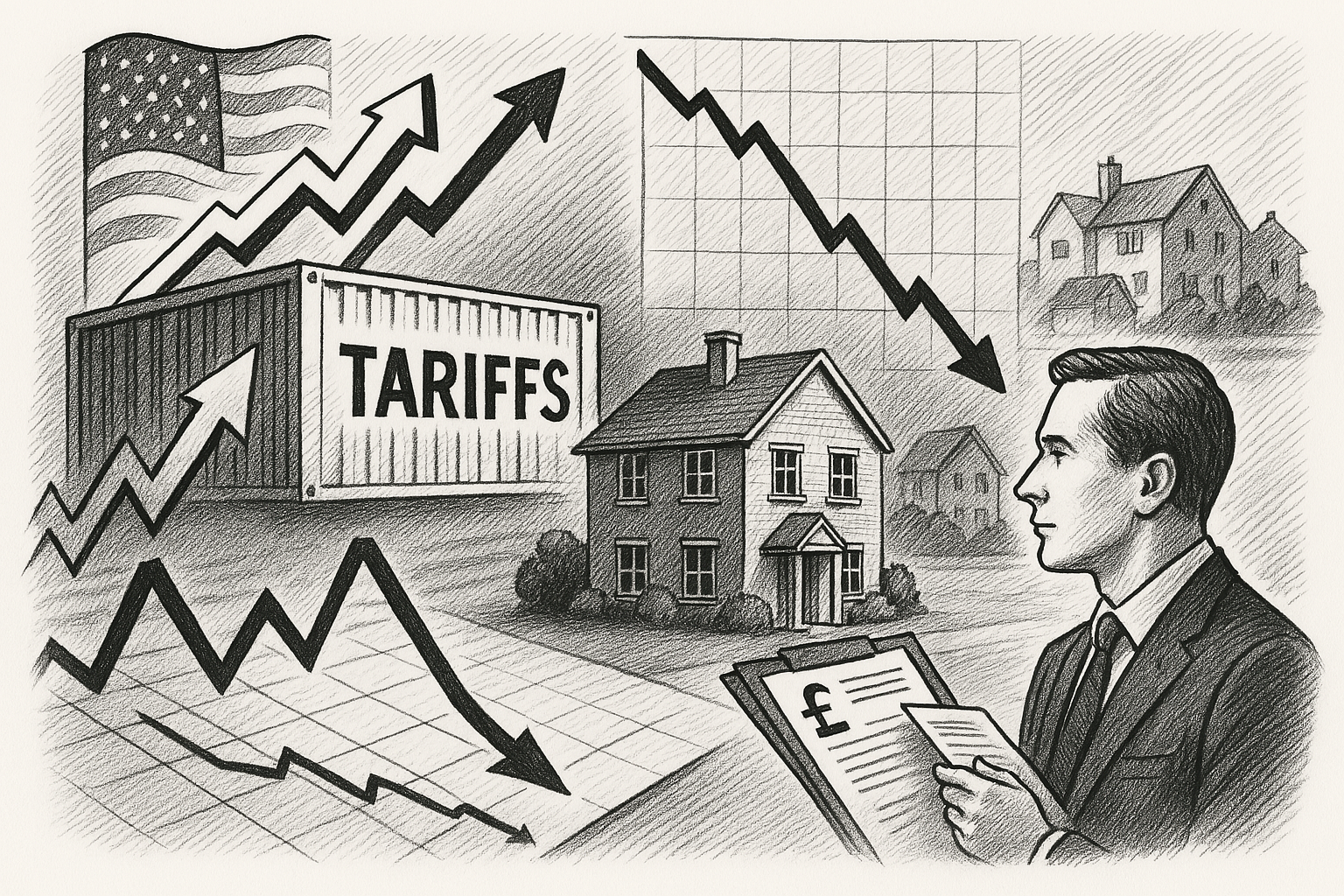How U.S. Tariffs Are Impacting the UK Housing Market
The global economy is more interconnected than ever, meaning events across the ocean can ripple into our daily lives in the UK. A prime example is the recent U.S. tariffs and their unexpected influence on the UK housing market. High-net-worth individuals, property investors, and even everyday professionals are watching how these international trade moves might affect their property plans. In such times of uncertainty, seeking UK mortgage advice is not just prudent, it's essential. By understanding the link between U.S. tariffs and the UK housing market, you can make informed decisions about mortgages, investments, and bespoke mortgage solutions suited to your needs.
Understanding the U.S. Tariffs and Their Ripple Effect
In early 2025, the United States government announced a new wave of tariffs on imports, part of a broader push toward protectionist trade policies. Dubbed a "Liberation Day" move by some, these tariffs include a 10% duty on goods from the UK. While these U.S. tariffs might seem like an American issue, they carry global implications. Such trade barriers can slow international commerce, rattle investor confidence, and prompt responses from other nations (for instance, China quickly retaliated with tariffs of its own).
Why do UK property buyers and investors need to care about U.S. tariffs? The answer lies in how closely intertwined global markets are. When a major economy like the U.S. takes an action that could dampen worldwide trade, financial markets react. Stocks can slump, currencies may fluctuate, and central banks re-evaluate their outlooks. All of these factors feed into the economic conditions that influence the UK housing market. In short, what starts as a trade policy across the Atlantic can end up affecting how much you pay for a mortgage in Britain.
Global Market Reactions and the UK Economic Outlook
The immediate fallout of the U.S. tariff announcement was felt in markets around the world. Rather than a localized issue, it triggered a chain reaction touching everything from stocks to commodities. Here are some key ripple effects and what they mean for the UK economy:
- Financial Market Volatility: Major stock indices, including the FTSE 100 in London, dropped sharply following the tariff news. Investors worried that a trade war could slow global growth, leading to sell-offs especially in sectors like banking and manufacturing. This kind of market turbulence, while unsettling, often drives investors to seek safer havens.
- Flight to Safety – Lower Interest Rates: As confidence in equities wavered, many investors moved money into safer assets like government bonds. In the UK, increased demand for gilts (government bonds) pushed their yields down. In fact, important interest rate benchmarks like the 5-year swap rate fell by several basis points within days. Markets began pricing in interest rate cuts from the Bank of England, expecting that policymakers might lower rates to support the economy if global trade slows. For anyone eyeing a mortgage, this shift is significant, lower swap rates generally pave the way for cheaper fixed-rate mortgage deals.
- Currency and Inflation Shifts: Interestingly, the British pound held relatively firm (even strengthening at one point) against the U.S. dollar in the wake of the news. This resilience suggests that international investors still view the UK as a comparatively stable bet. At the same time, commodity prices reacted; for example, oil prices dipped amid expectations of weaker global demand. Lower oil prices help to ease inflation in the UK, which is good news for consumers and gives the Bank of England more room to manoeuvre on interest rates.
- Economic Sentiment: Overall, business and consumer confidence took a cautious turn. UK firms that export to the U.S. grew anxious about potential sales slumps due to the tariffs, and consumers saw unsettling headlines about market dips. However, it's worth noting there was no panic, rather a measured shift to caution. The UK economy entered a "wait and see" mode, bracing for potential impacts but not yet showing signs of serious distress.
All these factors set the stage for what comes next. With markets anticipating easier monetary policy and investors adjusting their portfolios, the conditions that influence UK mortgages and property prices were already changing. The big question for anyone interested in property became: How will these global shifts translate into UK housing market trends and opportunities?
Impact on the UK Housing Market and Mortgage Rates
Even before the tariff drama, the UK housing market in 2024 and early 2025 was at a crossroads. After a period of rising interest rates aimed at taming inflation, there were signs of a slowdown in house price growth. In fact, house prices dipped slightly in early 2025 according to some indices, highlighting a delicate balance between buyers and sellers. The U.S. tariff shock adds another layer to this picture, but not all of its effects are negative.
A silver lining for borrowers: One immediate upside has been the prospect of cheaper mortgages. As noted, the expectation of Bank of England rate cuts caused a drop in the wholesale rates that lenders pay (like swap rates). Within days of the tariff news, several UK mortgage lenders responded by cutting their interest rates for new loans and remortgages. For example, some major lenders trimmed rates on fixed-rate deals, passing the benefit of lower financing costs on to consumers. This means that buyers and homeowners shopping for loans could suddenly find better deals on the table. Those looking for the best mortgage rates 2025 might see this period as an unexpected opportunity to lock in an attractive rate.
Cautious optimism in property demand: Lower borrowing costs tend to stimulate housing demand, after all, if mortgages become more affordable, more people can consider buying. High-net-worth individuals and savvy investors recognize that if money is cheaper to borrow, leveraging into property investments can be more appealing. We may see an uptick in activity from buyers who were previously on the fence, now encouraged by improved mortgage affordability. On the other hand, uncertainty can make some buyers and sellers hesitant. News of tariffs and trade tensions might cause a few prospective home movers to take a wait-and-see approach, especially if they are concerned about the broader economic outlook or their jobs.
House prices and inventory: It’s too early to draw firm conclusions on house prices, but a scenario is emerging. If demand holds up (thanks to cheaper mortgages) while the supply of properties on the market remains tight, remember that the UK still has a housing shortage in many areas, we could see price growth stabilise or even tick up later in 2025. Some analysts have gone so far as to suggest the tariff-induced rate drops could “single-handedly rescue” the housing market by revitalising buyer confidence. That might be optimistic, but it underlines an important point: the housing market’s fate could hinge on how significant and sustained the drop in mortgage rates is. With inflation pressures easing and competition among lenders heating up, there is potential for a more buoyant property market than anyone expected a few months ago.
Overall, the impact of U.S. tariffs on UK housing is a mix of positives and negatives. Cheaper financing is a clear positive, injecting a dose of affordability into a market that was feeling the pinch of high interest rates. Yet, the backdrop of trade uncertainty urges caution. We’ll explore how you can navigate these changes to your advantage, including practical tips for borrowers and strategic moves for investors.

Tips for Securing the Best Mortgage Rates in 2025
Even with favorable conditions developing, borrowers should be proactive to make sure they actually get a great deal. Here are some tips to help you secure the best mortgage rates 2025 has to offer:
- Stay Informed: Keep an eye on interest rate announcements from the Bank of England and market news. Rates can change quickly when the economic outlook shifts. Being aware of trends (like the tariff-induced changes we discussed) will help you time your decisions.
- Consider Refinancing: If you already have a mortgage, check your current rate against today's offers. Many homeowners who locked in deals when rates were higher could save by refinancing now. Even a reduction of half a percent can mean substantial savings over the life of a large loan.
- Consult a Mortgage Broker: An independent or private mortgage broker can scan the entire market for you, including deals not advertised to the public. They can quickly identify which lenders are offering the most competitive rates for your situation. Using a broker’s insight ensures you don’t miss out on limited-time offers that might emerge as lenders react to the changing market.
- Improve Your Profile: Borrowers with strong credit scores and clear financial histories tend to access better rates. Before applying, it’s worth checking your credit report, paying down any high-interest debts, and avoiding new credit commitments. A tidy financial profile gives you more negotiating power and choice of lenders.
- Act Decisively: When you do find an excellent rate, be prepared to move fast. Have your documentation ready (proof of income, bank statements, etc.) so that you can secure a mortgage agreement in principle. Good deals sometimes don’t last long, especially if market conditions are volatile. By acting quickly, ideally with guidance from your broker, you can lock in a low rate before it’s gone.
Following these steps will put you in a strong position to capitalize on the low-rate environment.
Opportunities and Strategies for Investors and High-Net-Worth Buyers
For those prepared to act, periods of uncertainty often come with a silver lining: unique opportunities for those ready to move. High-net-worth individuals and property investors, in particular, can find ways to turn market fluctuations to their advantage. Here’s how the current situation could present openings:
Refinancing and portfolio growth: If mortgage rates are trending downward, investors should review their current loans. It may be an ideal time to remortgage existing properties to secure a lower rate, which can significantly reduce interest costs and boost cash flow. For buy-to-let investors, lower rates mean improved rental yield margins. Some landlords might use this chance to expand their portfolio, for instance, refinancing one property and freeing up equity or capital to invest in another. With the right opportunity, an investor could lock in one of the best mortgage rates 2025 on a new acquisition, potentially increasing long-term return on investment.
Buy-to-let and rental demand: Economic jitters can actually bolster the rental market. If some would-be homebuyers delay purchasing due to uncertainty, they will continue renting, which sustains demand for rental properties. For buy-to-let investors, this environment can be favorable: strong rental demand coupled with lower interest expenses. It’s a good idea to evaluate your investment strategy, perhaps diversifying into different regions or property types. Just remember to factor in potential changes to regulations or tax policy for landlords, which operate independently of tariff issues but are part of the investment landscape.
Bridging finance for quick moves: In a fast-changing market, being able to move quickly is a huge advantage. Opportunities like a sudden dip in a property’s asking price or a limited-time offer from a lender can arise. Bridging finance is a tool that high-net-worth buyers and investors often use to act swiftly. For example, if a lucrative property deal emerges (say a prime London asset at a bargain price due to a motivated seller), an investor can use a short-term bridging loan to secure the purchase immediately, without waiting for a traditional mortgage process. Later, they might refinance with a standard mortgage once the dust settles. In uncertain times, having financing options like bridging loans at your disposal means you won’t miss out on time-sensitive deals.
Diversification and resilience: High-net-worth individuals typically have diverse portfolios, property is just one part of their assets, alongside equities, businesses, etc. With global trade tensions in play, it’s a reminder to ensure your overall investment strategy is resilient. Real estate remains a relatively stable and tangible asset. Some international investors might even increase their allocation to UK property now, viewing it as a safer haven amid global volatility. For example, someone worried about their holdings in the U.S. or Asian markets might shift more capital into British real estate, which could support demand especially in prime segments. If you’re an investor with a global perspective, consider the UK housing market’s fundamentals: undersupply of housing, a robust legal system, and historically steady growth. These make a compelling case that, despite short-term fluctuations, property here remains a sound long-term bet.
In all these scenarios, the common thread is the need for careful planning and agility. Investors and wealthy buyers stand to benefit if they stay informed and work with the right professionals. The next step is ensuring you have the guidance to navigate this landscape effectively, that’s where specialised mortgage advice comes into play.
The Importance of Expert UK Mortgage Advice
When the market is in flux, having expert guidance is invaluable. Whether you are a seasoned investor or a first-time buyer, getting professional UK mortgage advice can be the difference between capitalising on an opportunity or missing out. Here's why working with experienced advisors is so crucial right now:
- Interpreting Market Moves: Not everyone has the time or background to digest economic shifts like tariff announcements and interest rate forecasts. A knowledgeable mortgage broker or advisor keeps a close eye on these indicators and can translate what they mean for you. For example, if lenders are starting to reduce rates or adjust their criteria, your advisor will know and can alert you to act (perhaps suggesting it's time to lock in a fixed rate or to consider a particular lender).
- Access to a Broad Range of Lenders: In uncertain times, it’s useful to cast a wide net. High-net-worth clients often have access to private banks or specialist lenders that aren't on the high street. A high net worth mortgage broker (one experienced in serving affluent clients) can connect you with bespoke lending options. These might include interest-only mortgage structures, offset mortgages, or tailored terms that fit complex income streams. For professionals like business owners or those with international income, this access is invaluable. A private mortgage broker clients trust will know which lenders are flexible and can secure favourable terms even if your situation doesn’t fit the standard mold.
- Bespoke Mortgage Solutions: Every borrower’s situation is unique, especially in the upper tiers of the market. Rather than a one-size-fits-all loan, you may benefit from a bespoke mortgage solution. This could mean structuring a large loan across multiple properties, negotiating a higher loan-to-value for a prime property purchase, or finding a lender who can work with foreign currency income. Specialist brokers thrive in tailoring mortgages to the client, ensuring that even with turbulent market conditions, your financing aligns perfectly with your goals.
- Time and Stress Savings: Navigating the mortgage market can be time-consuming, more so when rates and products are changing rapidly. By working with an expert, you offload the legwork. Your broker will sift through the latest deals, handle the paperwork, and manage the application process from start to finish. This support is especially beneficial for busy professionals and international investors who may not be familiar with all UK lending nuances.
- Forward Planning: Good advice doesn’t just solve the immediate need; it also positions you for the future. Advisors can help you plan for different scenarios, for instance, advising on whether to go for a variable rate that could fall further if rates drop, versus a fixed rate that locks in today’s advantage for longer. They can also set you up with pre-approvals or decision-in-principle certificates so you're ready to pounce on the next opportunity, be it a dream home or an investment bargain.
The value of expert advice is amplified during uncertain periods. It’s about having a knowledgeable partner who can guide you through the maze of mortgage options in a changing environment. With U.S. tariffs shaking things up and potential shifts in UK interest rates, now is the time to lean on expertise.
Bespoke Mortgage Solutions for Uncertain Times
At Willow Private Finance, we understand the challenges and opportunities that come with market fluctuations. As a private mortgage broker in the UK, our role is to act as your dedicated guide through the complexity, ensuring you make the most of the current climate while safeguarding your long-term interests. We offer a holistic service for all your mortgage needs, from standard residential mortgages for your family home, to buy-to-let loans for investment properties, and even bridging finance for those time-sensitive deals that require speed.
Our approach is professional yet personal. We take the time to understand your unique circumstances, whether you’re a high-net-worth individual with an extensive portfolio or a professional looking to buy your first investment flat. With that insight, we can tailor bespoke mortgage solutions that banks on the high street simply cannot match. The goal is to secure you the best mortgage rates and terms available in 2025, aligned with your financial strategy and risk comfort.
Your next step: If you’re curious about how U.S. tariffs or any other economic changes could impact your property plans, it’s an ideal moment to reach out for mortgage advice. We invite you to contact the team at Willow Private Finance for a one-on-one consultation. Our experts will provide an approachable, no-obligation chat about your goals and how we can help achieve them.
In an interconnected world, staying informed and adaptable is key. By working with a trusted mortgage broker, you gain not only access to exclusive products and rates, but also peace of mind that you’re making decisions with the full picture in view. Get in touch with us today to explore your options and turn uncertainty into opportunity on your journey in the UK housing market.










